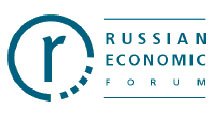Russian businessmen were in a talkative mood in London
 The Russian business elite were heading for London while high-ranking Russian bureaucrats looked around the technological wonders displayed at the Hannover Fair in Germany. The Russian entrepreneurs were flocking to the British capital to attend the 8th Russian Economic Forum.
The Russian business elite were heading for London while high-ranking Russian bureaucrats looked around the technological wonders displayed at the Hannover Fair in Germany. The Russian entrepreneurs were flocking to the British capital to attend the 8th Russian Economic Forum.

As regards the site of the forum, the so-called Russian elite still look quite monotonous and rather unpatriotic. Some prominent Russian businessmen and governors said at the last forum that a Russian city, e.g. Ryazan or Tula should be a more appropriate place to hold the next forum. But their plans fell through.
It appears that the Russian business people feel somewhat discouraged to speak out when they are on their own turf. Traditionally, "speakers deliver their most critical addresses when they take the floor abroad", according to Pyotr Aven, president of Alfa Bank.
Andrei Illarionov, economic adviser to the Russian President, was the only representative of the Russian government at the forum. He made an introductory report. Mr. Illarionov sounded quite typical. The beginning of his report concerned a few accomplishments and the end of it dealt with gloomy prospects for the Russian economy. According to Mr. Illarionov, average annual growth of the Russian GDP is 7.2%. It rose more than 1.5 times over the period of the last seven years. After mentioning other achievements of the Russian economy e.g. investment operations, consuming capacity, Mr. Illarionov touched on the negative trends. He believes the government is still incapable of holding inflation in check. "I would say that inflation is likely to stay at the last year’s level (11.7%) at best", Mr. Illarionov was quoted as saying. He described the current economic trends in Russia as "Venezuelization" referring to the dramatic impact on the economies of Venezuela and a few other OPEC countries after the their governments seized control over the oil industries in the 1950s. As a result, GDP per capita in those counties is 30% lower today than it was 30 years ago, according to Mr. Illarionov.
Former Russian Prime Minister Mikhail Kasyanov was expected to make sensational statements following recent reports on his potential participation in the next presidential election in Russia. Experts believed he might unveil his political program to the Russian business elite. But the content of his speech mostly related to economic issues in line with the format of the forum. "It is time to tell the truth", Mr. Kasyanov was quoted by Vedomosti as saying. He told off the government for botching up the latest social reforms that provoked nationwide protests and put the implementation of new reforms under threat. The former Prime Minister painted a fairly black picture whenhe talked about the continuous decrease of foreign investment in many sectors of the Russian economy. He said that inflation had gone out of hand and "the stabilization fund will be history" within a year should the world oil prices drop to the level of 2002. He came up with a medicine package, though. It includes budget cuts, presumption of innocence in terms of tax regulation, and steps to keep inflation within tough limits.
Once the pessimists exited the stage, "the cautious optimists" took the floor. According to Vemomosti, Victor Vekselberg, co-owner of TNK-BP, proved to be the biggest optimist of all the speakers. He seemed absolutely unfazed by the reports that the Russian authorities demanded that his company pay 22 billion rubles' worth of back taxes. But he expressed some concern regarding the attempts to limit the participation of foreign investors in the exploration of Russia's natural resources, and "the lessons of the Yukos case". Yet he remains "a moderate optimist in terms of the Russian oil industry", as he put it. Anatoly Chubais, chairman of the United Energy System of the Russian Federation, plainly confirmed that everything was going smoothly in the Russian economy. A slide show was a finishing touch to his presentation. It featured a nasty swamp (energy sector before the reform) turning into a meadow full of beautiful flowers (the sector after the reform).
As a whole, the mood of the speeches delivered at the forum has not changed much over the last year. This time the participants did not speak about the revision of the privatization results. Earlier this month the Kremlin pulled the plug on the issue by announcing a privatization amnesty. Maybe it is really about time the Russian business elite changed the location of the forum. A new place could give it a fresh boost.
Subscribe to Pravda.Ru Telegram channel, Facebook, RSS!


